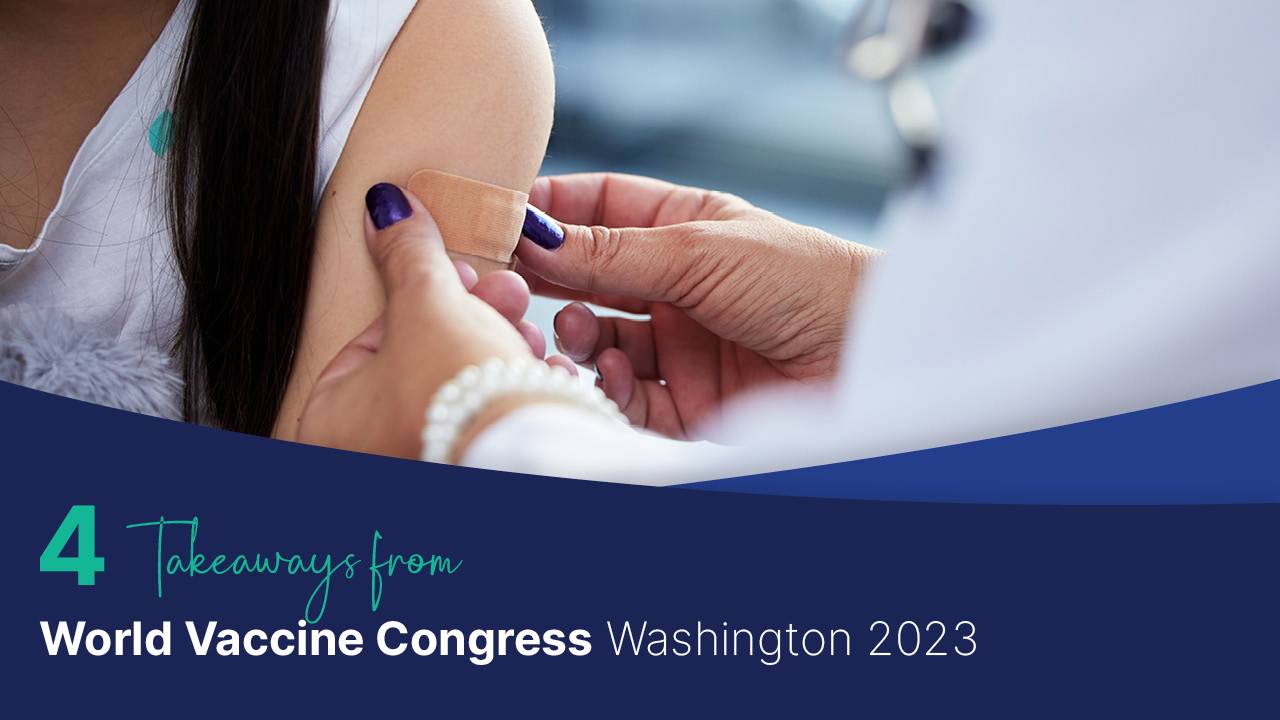The Headlands Research team of corporate and site leaders who recently attended World Vaccine Congress Washington 2023 were excited to learn about the latest developments and (re)connect with our colleagues. The event did not disappoint: “it was a great conference as always!”
Of the team, Chris Cugliari (Vice President of Corporate Development, Headlands Research), Andrea Hunnicutt (Senior Director of Operations, Headlands Research), Mauro Ormedilla (Site President, Artemis Research & Director of Business Development, Headlands Research), Lauren Chazal (Chief Business Development Officer, Headlands Research), and Michelle Sowell (President, Clinical Research Atlanta & Director of Vaccine Therapeutics) reflected on their congress experience, highlighting their four key takeaways:
1. Participant engagement, including recruitment of diverse populations, continues to be a focus.
2. Backing by private equity and the number of site networks are increasing, while the number of individual sites is decreasing.
3. Clinicians (and the public in general) are uncertain about the future of COVID-19.
4. The future is bright for vaccine development.
Participant engagement, including recruitment of diverse populations, continues to be a focus.
A topic that quickly emerged from the COVID-19 pandemic was the effect of rhetoric and misinformation on the public’s perception and acceptance of new, and even well-established, vaccines. Given this and the existing reluctance of large swaths of the general population to participate in any clinical trial, the question of how to engage participants in vaccine clinical trials has been on the minds of many. This was reflected across multiple conversations at the congress, and consensus among all sessions on this topic was that we need to address the trust factor. An expanded role of primary care physicians (PCPs) in vaccine trials was suggested as a solution — people are more likely to trust their PCP’s recommendation over information presented in the form of an ad on social media or other channels.
Sessions also focused on how to reach and recruit from under-privileged areas and more diverse populations. Recurring questions, however, were “How do we define diversity for clinical trial recruitment?” and “What are the FDA’s expectations regarding diversity in clinical trials?” Should we be focusing on racial/ethnic diversity, achieving representation for the areas from which we're recruiting, determining differences in drug metabolization, or doing something else? Specific guidance from the FDA and other regulatory bodies is expected in the coming months, which should hopefully clarify how recruitment should be approached to meet their goal of a diverse participant population. Until then, many in the industry are unsure if their recruitment approaches will meet regulatory agencies’ expectations.
Another challenge for reaching diverse populations is selecting appropriate sites. Many pharma companies and CROs continue to select sites that do not have the population of interest, and the result remains the same — the same demographic characteristics in every study. For greater success, spending the time to research a range of sites and their populations before selection is critical.
Backing by private equity and the number of site networks are increasing, while the number of individual sites is decreasing.
At the same time, multiple CROs and sponsors mentioned their usual sites are currently saturated, prompting the need to find new sites. This need for new sites, combined with wanting to access new populations, is also fuelling investment by private equity (PE) firms in clinical trial sites and networks. As a result, compared with previous years, there were significantly fewer independent, smaller sites present. Instead, most clinical trial sites represented at the congress had joined a larger PE-backed site network.
Other strategies to increase the available site pool include using pharmacies such as CVS as satellite sites to augment clinical trial site capabilities. This could also provide more convenient locations for participants to visit, given the geographic distribution of CVS facilities across both rural and urban areas. However, the principal investigator (PI) remains responsible for all site activities, including the investigational product, labs, and more, which are all assigned to a specific site (not a satellite). Therefore, we anticipate that oversight of these satellite sites, especially if they are geographically dispersed, by the PI at the main site will be challenging.
Clinicians (and the public in general) are uncertain about the future of COVID-19.
Although the world seems to be moving on, for the most part, from COVID-19, considerable uncertainty still exists within medical circles about the following:
- Potential COVID-19 variants, their pattern, and their severity
- Whether COVID-19 is seasonal or always communicable
- Durability of vaccine-induced immunity
- Differentiating characteristics of the vaccine choices and how to decide when and who should receive which option
Given the mixed messages from governmental agencies, exponential publication of new study results, and widespread misinformation, this level of uncertainty is not surprising nor are the more than 3,000 results from a quick search for COVID-19 vaccine hesitancy in PubMed. Michelle Sowell walked away from the congress reflecting that “we need to educate the community and primary care physicians that we are, in fact, still learning about COVID-19.” Transparent communication, even about what we don’t know, can help empower the public to better understand the situation and make evidence-based decisions. At the same time, Mauro Ormedilla found COVID-19 vaccine development promising: “Although no one seems to know which direction the COVID-19 landscape is going, there are many efforts to formulate different vaccines that will work against any potential strain.”
The future is bright for vaccine development.
In fact, COVID-19 vaccine research has opened up many avenues for vaccine development in other therapeutic areas such as cancer, autoimmune diseases, and more. This potential has encouraged emerging biotechs to enter the space, and we noticed an increase in the number of early-phase vaccine trials being discussed at the congress. In the first 4 months of 2023, 55 Phase 1 studies were added to clinicaltrials.gov for vaccines against cancer (e.g., angiosarcoma, solid tumors, hepatocellular cancer, ovarian cancer, breast cancer) and infectious diseases (e.g., hepatitis B, herpes zoster, HIV, RSV). Of trials for infectious diseases, 11 are investigating COVID-19 vaccines, reflecting the ongoing interest in finding effective solutions for this disease.
Other exciting vaccine developments discussed at the congress included innovative administration routes, such as intranasal sprays and adhesive patches. The latter could help eliminate some of the challenges associated with transportation and storage of vaccine technologies such as mRNA and therefore provide greater access to populations where the required infrastructure might be limited or completely lacking.
Everyone also walked away glowing from unsolicited positive feedback from sponsors and CROs mentioning our organization’s great reputation within the industry — “I have heard nothing but great things about your organization.” A special thank you to our corporate team and all our sites who are helping Headlands Research achieve our mission of improving people’s lives by advancing innovative medical therapies.
Learn more about our sites and their research and make sure to say hello to our Chief Business Development Officer, Lauren Chazal, at Vaccine Summit Boston!

